In March of 2020, after pastoring for 18 years in large and small church contexts, I decided to resign to pursue other opportunities. If you’re in a season of transition or trying to make sense about what God may be doing in you to prepare you for something new and different, I know what it feels like and you’re not alone.
I want to share with you the path of transition to help you better understand the season of your life and what phase of this season you may be in. Before we dive into that, though, I want to first share some indicators that you may be entering or already in a time or season of transition.
The first is that you have this unsettledness, like there is this looming or pending sense that you’re moving towards something different. Maybe there’s a change, something has happened, and these things can trigger transition.
Maybe there’s been a disruption, something that was unexpected but it has disrupted life as you knew it. Or even disagreements. Disagreements can be used or even trigger seasons of transition. If you’re experiencing any or some of these things, don’t be alarmed.
Indicators Of A Transition:
- Unsettledness
- Change
- Disruption
- Disagreements
There are a couple of other things that you need to be aware of too. First, as you’re in this transition, more than likely you are going to be misunderstood, and second, and hopefully more encouraging, you are hearing God more than you realize.
It is helpful to consider that the Lord’s way as we’re navigating a season of transition is often is obscurity. A transition is the in-between time of life as you knew it and something completely different. And what if during this time of transition, God is desiring to prepare you for something different?
The Path Through A Season Of Transition
In Ecclesiastes 3:1, it says that there is a time for everything and a season for every activity under the heavens.
I want to help you understand what season you may be in and what this season may be about for you. Because in this season of transition, you are moving from one place to the other and I think that the path or the way that we navigate this is best represented in a 2×2.
In one very real sense you are moving from what has been familiar, or in other words, the past, to something new and different that is the future. And, here’s also another dynamic that is at play where you are asking questions in hopes of gaining clarity.
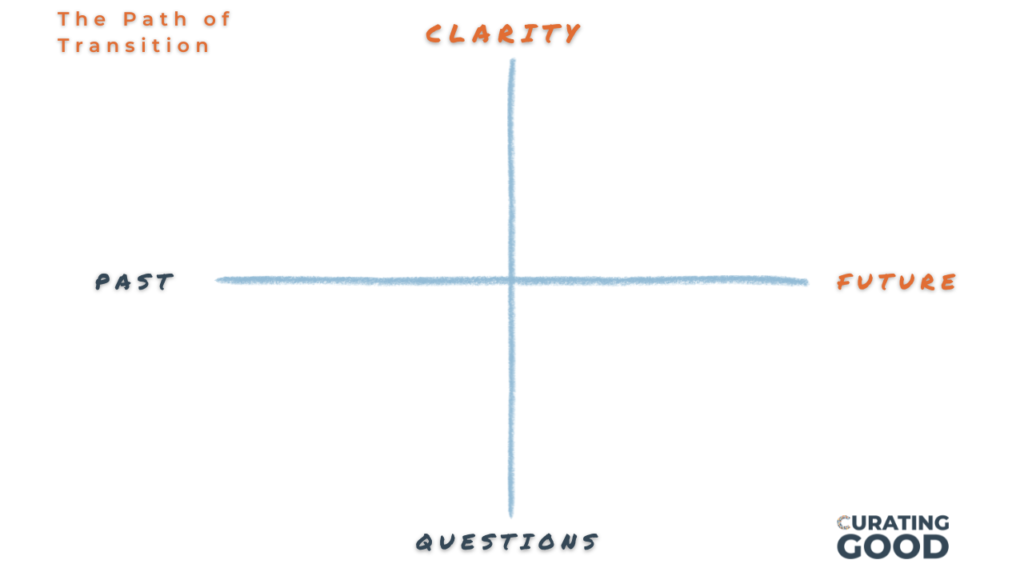
And each quadrant of this 2×2 represents significant phases of transition. Considering the following path could help you better understand and navigate through this time with more grace and even a bit more assurance and confidence. There are. times where we need to put our hearts and minds at ease. In difficult or perplexing times it is comforting to know that you’re not the only one and you’re not alone.
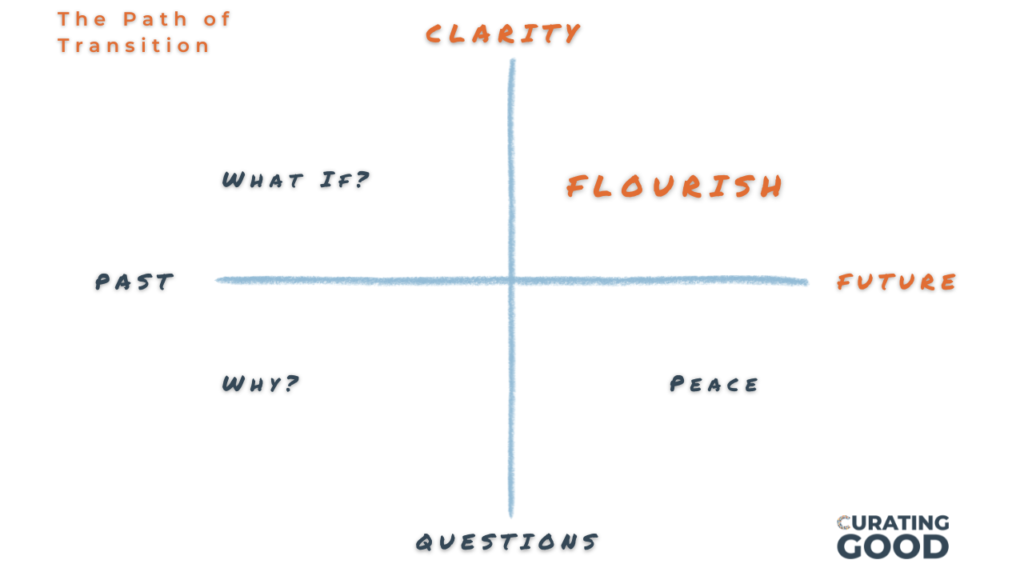
Phase One Of Transition: Why?
Everyone enters is in the quadrant represented by the word “why.” As you enter into the transition, it is helpful to focus on being rather than doing. For some, settling into this idea can be quite challenging. And you also want to pay attention to your pace. This is going to be a time where you slow down.
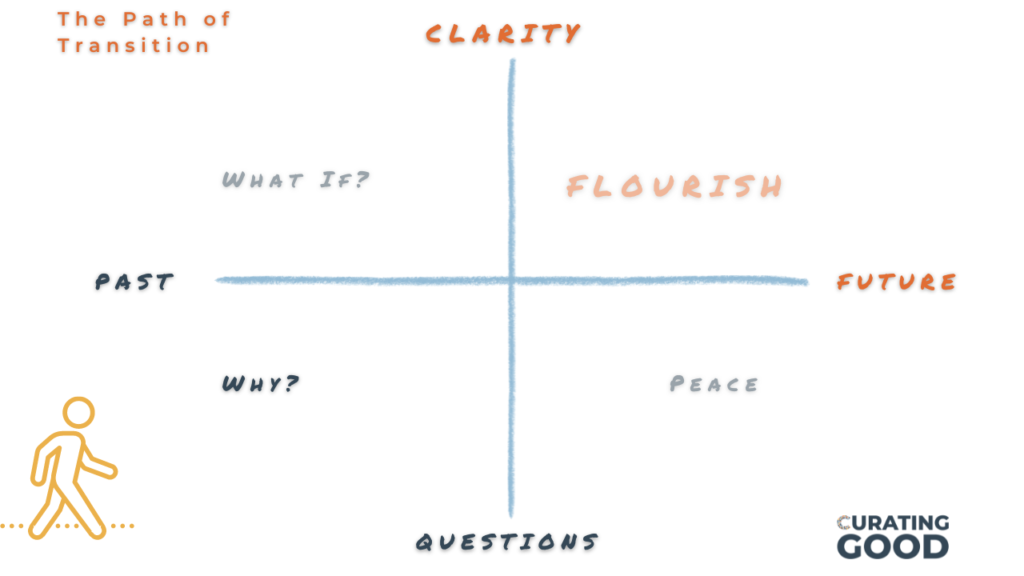
I grew up water skiing and wakeboarding and if you’ve ever done this then you understand that the key to staying on top is you have to be moving at a fast enough pace, you have to have speed. If you slow down too much then you will begin to sink. And for many of us, moving and keeping things at a certain speed helps us to feel safe and keeps us from having to confront or address things that may be below the surface. But in this phase of transition, you have to slow down so that you can sink just enough, not to drown, but to begin identifying and addressing things that may be below the surface.
It’s within this phase that you’re asking a lot of questions like,
- Why am I here?
- How did I get here?
- God, who do you want me to become?
You could be processing woundedness. There may be statements that have been made towards you that have affected you, that you’ll be reminded of or need to confront and address.
As you’re asking these questions and reflecting you want to begin identifying truths that can anchor your heart and mind to God’s word and his promises. A coach of mine once made a statement too me that was profoundly impactful:
There are things that God has planted in you that you just do not quite see clearly yet.
Speaking of that, if possible, it is extremely helpful to go through this process with a coach, director, or a close friend – someone that can provide outside perspective and sober input.
To start, if you could write or say it in one sentence, how did you get here? What has brought you to this place of transition?
If you need help with this season of your life, I want to invite you into a community that I host where you can receive coaching and support alongside others. If you’d like to learn more about this community, please use the form below and I will send you more information you need.
Phase Two Of Transition: Peace
As you’re asking questions and processing things related to the past, eventually you begin to make peace with where you are, even though things still may be a little unclear, you’re okay. Something that is going to occur that you may not have seen coming is that you are going to begin to be more comfortable with abandoning the identity that you have adopted up to this point in your life.
For me, it was titles, it was roles, it was things like leadership or pastor. In time, you actually begin to be comfortable with abandoning those titles and those things that brought a sense of identity to you. You begin to become more intrigued with becoming the person that God already knows you to be.
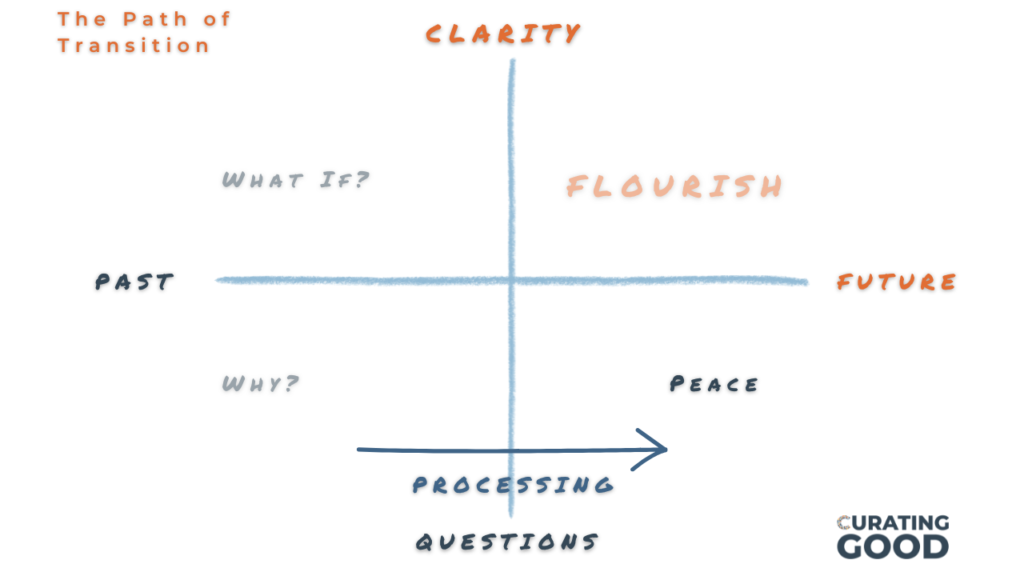
In this place of peace, you begin to recollect the skills, the experience, the talent, the contributions that you have to offer and the things that you bring to the table. You even begin to make some decisions about things that are meaningful to you, the values that you want to carry forward, the type of person, the type of leader that you want to be. And actually, what is happening is,
Your outer life that you describe with your words or language are in the process of catching up with what you’ve already decided inside your heart.
Let’s go to a passage in Joshua chapter 1, it says, after the death of Moses the servant of the Lord, the Lord said to Joshua son of nun, get ready to cross the Jordan River into the land I am about to give to them to the Israelites. I will give you every place where you set your foot, as I promised Moses.
So two things, two specific phrases that I want you to pay attention to, get ready and about to. Keep in mind, Joshua was leading a group of people that were in a place of in between, they were in significant transition and a lengthy one at that. They were no longer in Egypt, the place of captivity, but they were not yet in Canaan, the promised land. They were still in between. As you may be aware, God was using this time to develop things within this group of people, and God will do the same thing within you and I. He will use these times of in between to prepare us for greater purpose and greater impact.
This phase of transition is also about character formation.
Let me ask you a question, is there anything that would change in your life or leadership right now if you begin to view this in-between time as space separating the place God has delivered you from and the place God is developing you for?
God never wastes anything, He doesn’t waste His word and He doesn’t waste His promises, and He’s also known for using bad things for the good. And so therefore, I believe that staying in this place of in between is never God’s complete and final plan for us.
What happens next on the path of transition is you begin identifying values that are important to you, your character is building, you’re beginning to recollect the things that you could contribute. You begin to have some confidence about ideas and ways that you could move towards the future.
You start asking the question, what if?
Phase Three Of Transition: What If?
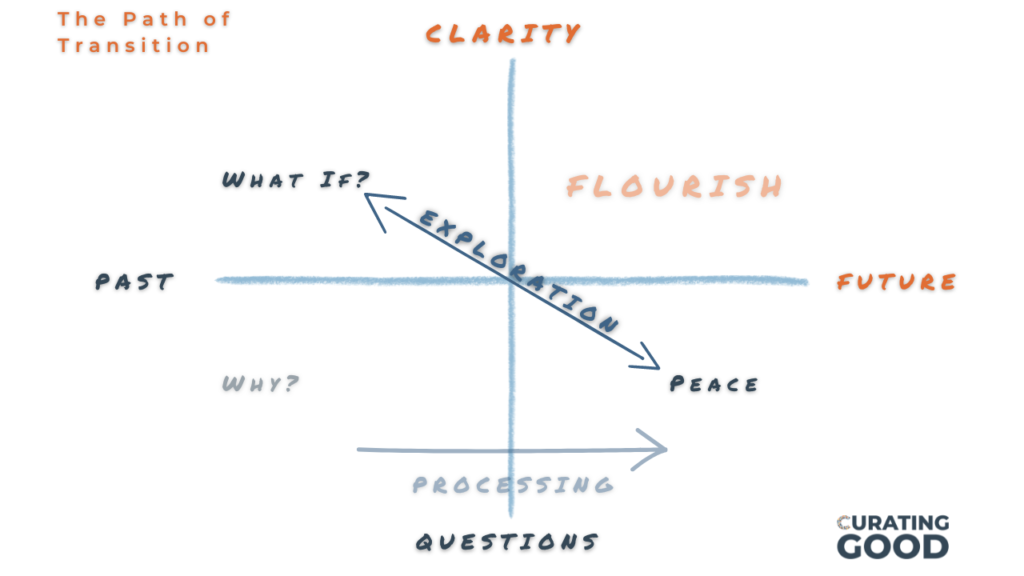
Really, this phase is about evaluating things that you could do and things that you should do – big difference. Ideas are surfacing, you’re beginning to pinpoint, you’re getting a vision that seem to make sense. But, as certain as you begin to feel about some things, you will then begin to feel a measure of uncertainty. And this is completely normal and completely okay. This phase of the path is about exploration.
You’re trying things, you’re testing things, you’re seeing how ideas feel and fit, but you’re also still asking some questions. In this phase you are oscillating. You’ll actually go back and forth between certainty and uncertainty, certainty, uncertainty. This is completely normal. You’re still asking questions, and one to consider is,
How could God use this time of in between to sharpen, refocus, or even redirect your life and leadership?
Let’s go back to the book of Joshua. After God instructs Joshua to get ready for what he is about to do, God then puts things into perspective for Joshua. In chapter one verse six, He says, be strong and courageous because you will lead these people to inherit the land I swore to their ancestors to give them.
Did you notice anything? Are you picking up on this perspective shift? That the promised land was not just about the people who were about to enter into it, it was for others too.
What is God leading you toward? What is God doing within you? What is He developing in you that others will benefit from as well? Because whatever God is doing within you, wherever He is leading you towards, it is for someone else too.
Do you believe that?
This section of transition, this phase of exploration is about getting a vision for how your transition is just as much for others and about others as it is for you. Below are some additional questions to help you explore and make sense of this phase.
- What might the next chapter look like based on what God is doing within you?
- As you listen, listen to yourself, describe what the future could look like, what do you hear yourself saying?
- If you could describe in one sentence what you want to do, what is it?
As you are exploring and evaluating, the purpose of this transition will start to become more clear. You begin to see how and why this season is so valuable, and it’s in this time that you begin to make decisions that are faith decisions. These faith decisions, shaped and formed through the process of transition, help guide you into a place of flourishing.
Phase Four Of Transition: Flourishing
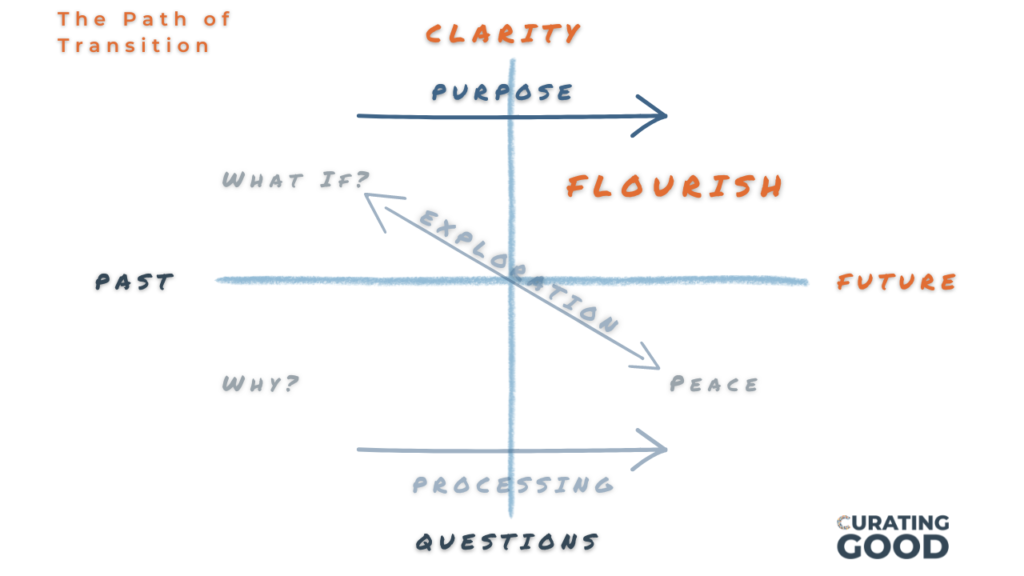
Let’s go back to Joshua one last time, in chapter one verse 10. So Joshua ordered the officers of the people: “Go through the camp and tell the people, ‘Get your provisions ready. Three days from now, you will cross the Jordan here to go in and take possession of the land the Lord your God is giving you for your own.‘
Movement requires decisions, and the faith decisions Joshua made determined the promises that he would experience. Joshua decided to partner with God, and he willingly allowed God to use the time in between the past and the promise (a season of transition) to impact his purpose for the future.
Will you?
Will you allow God to use this season, this transition? Let me encourage you, God is with you. You’re not alone, you’re not the only one. I hear lots of stories even in this exact moment how many followers of Christ are in a season of transition. You’re either going to hold on to old ways or you’re going to engage in the journey towards something new and different.
New work always starts with interruption. What disruption in your life could be the start of something new, different, and better?


